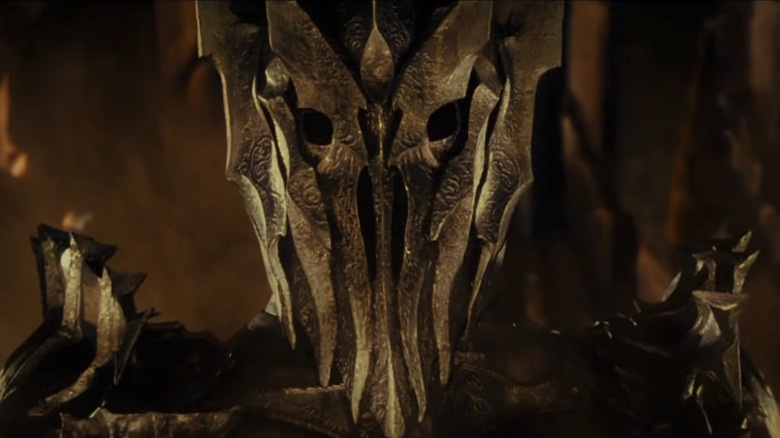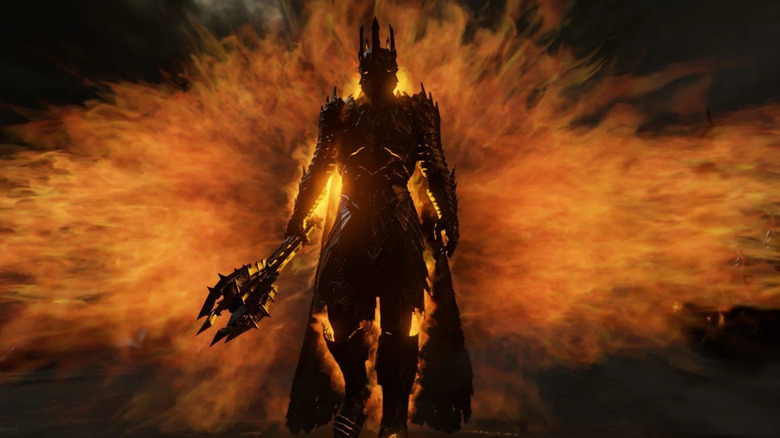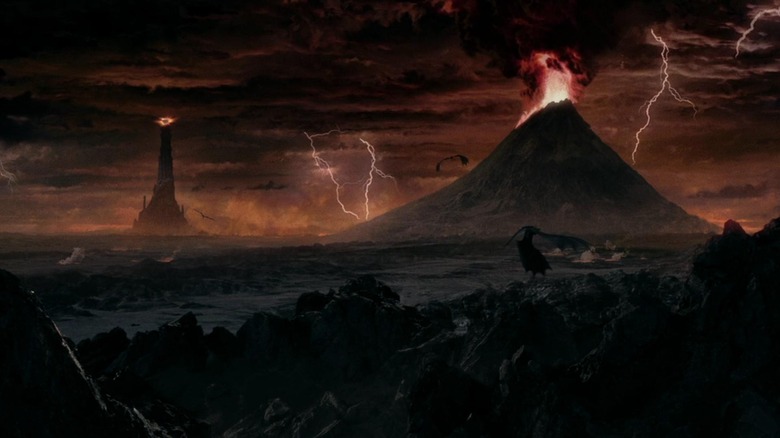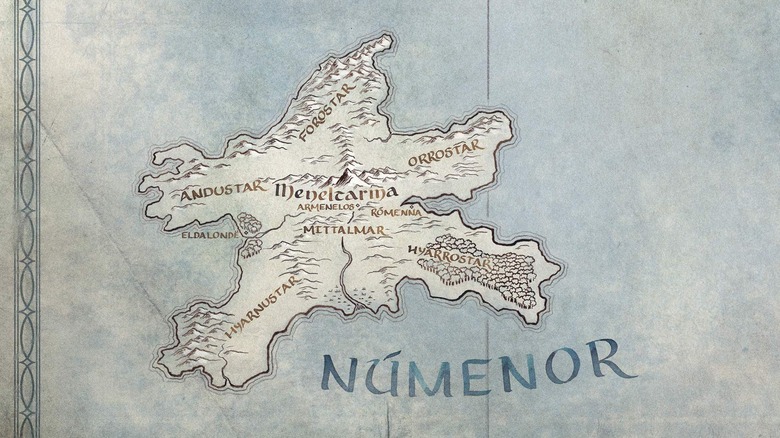Why Sauron's Absence From Amazon's Lord Of The Rings Series Is A Good Thing
Everyone's been waiting with bated breath for Amazon to release something — like, seriously, anything — about their forthcoming Middle-earth show. Up until now, most of the reveals have been production-oriented, things like costs, filming locations, and cast and crew. True, a bite-size synopsis was revealed in early 2021, but even that was technically leaked and then confirmed after the fact.
While Amazon Studios remains as tight-lipped as ever, the fan site TheOneRing.net (the same ones that originally published the show's synopsis) has once again managed to dig up some info on the upcoming series. And when we say "some," we're talking about an avalanche of information that the publication not only released but claimed it was mostly able to verify.
Sitting tall amongst the list of nearly twenty different Amazonian Middle-earth factoids is the surprising line "Sauron/Annatar will not be revealed in Season 1." This may have caught many off guard, especially considering the buzz that the titular villain of "The Lord of the Rings" trilogy has had in connection with the show. After all, it was none other than TheOneRing.net that also shared an update on Twitter back in mid-2020 stating that Galadriel, Elrond, and Sauron were confirmed for the series.
The presence — or lack thereof — of the Dark Lord isn't a surprise for reasons that we'll break down in a minute. Suffice it to say, everyone expected to see Sauron (both as the Dark Lord and in his attractive disguise as Annatar) both early and often throughout the series. The fact that he might not even make an appearance throughout the entire first season, though, well that comes as a bit of a shock — that is until you really break down the facts.
Sauron is the main villain of the Second and Third ages
Fans of the "Lord of the Rings" books and movies alike are familiar with Sauron as the primary villain during the War of the Ring. Even big shots like Shelob, Saruman, and the Witch-king pale in comparison to the mighty Lord of the Rings. In the films, Sauron is shown as a flaming spot-light-of-an-eyeball off in the distance, while in the books he's hardly described at all. Leading from afar, the Dark Lord doesn't reveal himself during the war. Instead, he opts to guide events from the background with a terrifyingly steady hand. Even so, his shortsightedness with the One Ring ends up leading to his own doom and ending his reign at the end of the Third Age.
Fans who have also watched or read "The Hobbit" are also aware of Sauron's presence in that story. For readers, the villain remains on the edge of the narrative, while watchers of the films are intimately familiar with his involvement in his guise as the Necromancer.
But it turns out that all of these events are just the finale, the coda, the encore of a very long, prestigious career spent villainizing the Free Peoples of Middle-earth. In fact, Sauron gets his start as the Dark Lord all the way back in the Second Age, thousands of years before "The Lord of the Rings" or "The Hobbit" stories take place.
He begins his reign as arch-villain after his previous master, Morgoth, is defeated at the end of the First Age. During the Second Age that follows, Sauron pretends to befriend the Elves, helps forge the Rings of Power, creates his own Ring to control them, and then wages a centuries-long war on all of Middle-earth. It's only when he's defeated at the end of the age and the Ring is cut from his hand (sound familiar?) that the Third Age stories we know so well kick off.
Sauron's story gets a slow start
So, if Sauron's heyday is during the Second Age, why isn't he going to show up in the first season of Amazon's show? The answer most likely has to do with timing. The truth is, while he ends up being a massive threat that overshadows history for millennia, Sauron's story drags a bit early on. After his master's downfall, the Dark-Lord-in-waiting actually spends several centuries hiding in anonymity before we see him again.
In the appendix for "The Return of the King" book, it explains that approximately 500 years into the Second Age "Sauron begins to stir again in Middle-earth." Even then, he doesn't make any big moves for another five centuries. All we hear is that, according to "The Silmarillion," his pride grows, "but for long he dissembled his mind and concealed the dark designs that he shaped in his heart."
Finally, around 1,000 years into the age the source material tells us that Sauron, alarmed at the growing power of his enemies, chooses Mordor as his official headquarters. 200 years later, he seduces the Elves into being his friends by appearing to them in the attractive form of "Annatar, the Lord of Gifts." He teaches the Elves how to make Rings of Power and forges the One Ring four hundred years later. Yeah, and his story is still just getting started at that point.
So, when you break things down, Sauron's presence isn't integral to the earlier parts of the Second Age story. On the contrary, while that era gets off the ground, the villain is nowhere in sight. Sure, he's hatching plans and sneaking around in the dark, but even Tolkien doesn't tell us what he's doing.
Of course, that doesn't change the fact that, even with Sauron out of the picture for a while, a lot of stuff is going on during those centuries.
Sauron's absence allows Amazon to focus on worldbuilding
While the Dark Lord is going to make a devilishly bad-ass villain for the series, there's plenty of material to cover without rushing the Sauron storyline. In fact, the absence of the hero paves the way for a nice, slow first season focused on high-quality world-building.
This isn't just a random guess, either. Even Amazon exec Jennifer Salke has confirmed that establishing the world itself is going to be a critical part of the first season. When asked about the first season's rumored enormous $465 million budget, Salke justified the monstrous expense by stating that "that is really building the infrastructure of what will sustain the whole series." In other words, Amazon is in no hurry to rush Sauron onto the scene — and that's a good thing. If the show really starts during the earlier portions of the Second Age, they'll be able to focus on several important events.
For instance, the Elvish kingdom of Lindon is mentioned in the leaked synopsis. That has to be established. The same can be said for the legendary kingdom of men called Númenor. The Dwarven kingdom of Khazad-düm (read: Moria) also goes through some major transformations at that point. Heck, there are even entire stories that Tolkien wrote, like the tale of Aldarion and Erendis: The Mariner's Wife, which takes place in the prelude to Sauron's rise to power. That particular story ends with a letter that literally contains the line "A new shadow arises in the East ... a servant of Morgoth is stirring, and evil things wake again."
Talk about setting up a villain in style.
Amazon is smart to delay Sauron's debut
While there's still very little information to go on, it appears that Sauron will definitely be in the show but not in the first season — and both of those facts are A-okay. By taking the slow approach, Amazon is giving itself plenty of room to set things up for success. The studio has the rights for at least five seasons of the show. On top of that, according to the Spy Report, the Tolkien Estate is very happy with how well things are going so far, which could bode well for future seasons.
With so much room to stretch their legs, why would the studio want to rush the appearance of such an important character? Sauron has the potential to simultaneously serve as the main villain for the series and one of the primary connections fans will have between Amazon's show and "The Lord of the Rings" and "The Hobbit" lore that we all know so well.
With so much material to cover, even just in the lead-up to Sauron's rise to power, we're glad they've opted to punt on revealing the antagonist in the first season. It makes much more sense to leave him as a teaser, lurking on the edge of the story, causing trouble just out of sight, and waiting to dive into the fray at the right moment.
Because one thing is for sure. Once Sauron does show up, there's no turning back.




